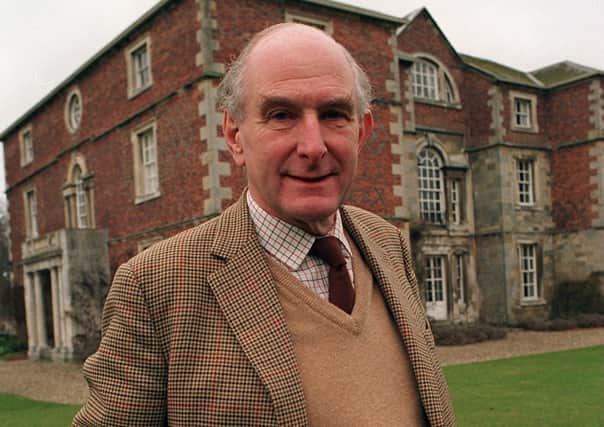Obituary: Richard Marriott, former Lord Lieutenant of East Yorkshire


Richard Marriott, who has died at 90, was a former stockbroker who served as Lord Lieutenant of East Yorkshire from 1996 to 2005, and as High Sheriff of Humberside in 1991 and 1992.
A peripatetic childhood had brought him to the East Riding from Essex, via London, West Sussex and, during the war years, Farnley, Leeds. But it was not until 1981 that he and his wife, Sally, bought the country house and estate of Boynton Hall, outside Bridlington.
Advertisement
Hide AdAdvertisement
Hide AdThe hall had been sold by Mr Marriott’s uncle in 1950, having been in the extended family since the 1550s, and over the next four decades, the couple painstakingly re-purchased its buildings, books, furniture, pictures and land.
It was Mr Marriott’s ancestor, William Strickland, who built the first hall, apparently on the proceeds of having brought the first turkey to Britain. Legend had it that he acquired six of the birds by trading with Native Americans while on an early voyage to America in 1526. He brought them back home and sold them in Bristol market for tuppence each.
However, the provenance of the story was questionable, as Mr Marriott was the first to acknowledge. “There’s no real proof,” he said in 2012. “I am sure there must be something there which links him more positively with the story of the turkey but it is very difficult to pin down a provable historical fact.”
Nevertheless, Strickland, who later became the Puritan MP for Scarborough, adopted the turkey as the family crest.
Advertisement
Hide AdAdvertisement
Hide AdRichard Marriott was born on 17th December 1930 in Bishop’s Stortford, Essex, to Major Rowland Marriott and Evelyn (nee Caillard). Major Marriott worked at Lloyds Bank in the City and served with Military Intelligence during the Second World War.
Books became an intrinsic part of Richard’s life from the age of six-and-a-half, when his father’s diary recorded that he “quite suddenly found that he could read and only the loudest shouts distracts his attention from his books now”.
D-Day saw him sitting his exams for Eton College, where his love of rare books flourished in the College Library. Brasenose College, Oxford followed, but his studies came second to rowing and the art of book printing.
After completing his National Service in the Rifle Brigade, he chose to surrender his commission and joined the Territorial 21 SAS, the UK’s Special Forces group, as a trooper, rising to become its colonel in 1967. He adored his time as commander of the regiment and often recalled exercises in Europe. A particular memory was spending a week in a West German forest dugout, emerging to discover that he had entirely missed the Six Day War.
Advertisement
Hide AdAdvertisement
Hide AdHe had dreamed of a life in books, but the need to support himself and his parents – now living at Cotesbach Hall in Leicestershire – drew him into finance. He joined the banking firm of Brown, Shipley and Co in 1954 but, despite working in the City, devoted his time increasingly to the SAS – square bashing at the Artists’ Rifles’ Drill Hall in Euston, London or out on exercises.
Following his move to Mullens and Co, stockbrokers to the British government, he played a key role in enacting Harold Wilson’s nationalisation of the British shipyards and was one of two coordinators for the world’s largest share offering – the first sale of the UK’s holding in BP.
Having decided that the gilt edge market was not for him, he focused on equities especially for charitable institutions, travelling increasingly to Germany, Switzerland and, with the lifting of exchange controls, to Japan, Hong Kong and Singapore.
The Big Bang of the 1980s heralded his slow departure from the City, but his skills in finance guided the committees of the Army Benevolent Fund, the Royal United Services Institute, The Officer’s Association and the National Army Museum.
Advertisement
Hide AdAdvertisement
Hide AdHe continued to take pleasure in his library of books, gathered over a lifetime, his deep love of opera and music plus the company of his many friends and family members.
Appointed a Commander of the Royal Victorian Order in the 2006 New Year Honours, he is survived by Sally, whom he married in 1959, their two sons, Charlie and James, and grandchildren, Kathy, Lizzie and Alexander.
Comment Guidelines
National World encourages reader discussion on our stories. User feedback, insights and back-and-forth exchanges add a rich layer of context to reporting. Please review our Community Guidelines before commenting.